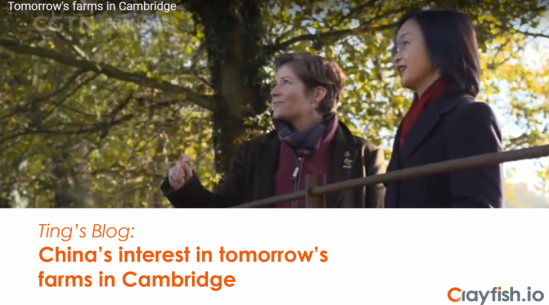Earlier in November, on a perfectly beautiful autumn day, I joined Emma Fletcher, Managing Director at SmithsonHill, in an interview as part of the CGTN France TV programme “Tomorrow’s farms in Cambridge”.
Food and drink in the UK is the largest manufacturing sector, with the wider food chain contributing £112bn GVA and employing one in eight people across the country. The UK is a global centre of excellence for AgriTech research, development and innovation, with £200 million of additional funding invested nationally since 2013 through the UK’s Industrial Strategy for Agricultural Technologies.
Cambridge has a globally recognised concentration of life science, advanced technology and research establishments unmatched in Europe and it continues to grow at 7% per annum. Cambridge University has the world’s best innovation ecosystem, including its Global Food Security department, and the city boasts renowned research institutes such as the Medical Research Centre Laboratory for Molecular Biology, National Institute of Agricultural Botany, the Babraham Research Campus, the Wellcome Trust Genome Centre and the BioMedical Campus. Global companies such as Pfizer, Amgen and AstraZeneca are just a few of the big names among the 4,300+ knowledge intensive firms in Cambridge.
On the other side of the globe, we’ve seen that the Chinese government has earmarked roughly £1.5 billion in the current 5-year plan, and AgriTech is one of the key areas it is focused on. This is because China must feed one-fifth of the world’s population from only one tenth of its arable land: China estimates that by 2030 it will need to produce an additional 100 million tons of food each year.
Using technologies such as AI and data analytics solutions means both energy and resources can be used more efficiently. Strategic alliances (with data or ecommerce giants) has become a main way to reform for many Chinese agriculture firms. However, the use of IT in China’s agriculture industry is still very limited, less than half of the average level in the world. In processing technology, China also lags behind – only 20% of its agricultural products have been processed, compared to 90% in the West.
Over the past few years, Chinese investors have been visiting Cambridge to look out for good technologies that can make a much bigger impact in China. So far, AgriTech has not been on their shopping list. But with the proposed new AgriTech park ARC, this may change. More Chinese investors will be made aware of the golden opportunities in Cambridge brought by the city as it plays an active role in delivering the government’s vision of the UK as a world leader in agricultural technologies, innovation and sustainability.
The UK’s AgriTech industry has great potential to partner with China to deliver a win-win for both economies. For example, as China starts focusing more on food quality, the country may be keen to make the best of British expertise in reducing chemical use and applying precision farming techniques to support waste reduction and enhance food safety.
At the heart of the most productive agricultural area in the UK, ARC may be an important location for key companies and individuals involved in the future of global food and agricultural technology. The proposed AgriTech park will also provide a physical space to enable collaborations started in Cambridge to be taken back to benefit the food industry in China. And Crayfish.io will be there to help facilitate such collaborations in an efficient and cost-effective way.
